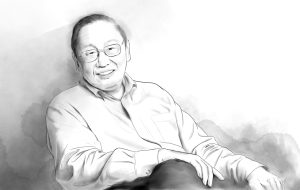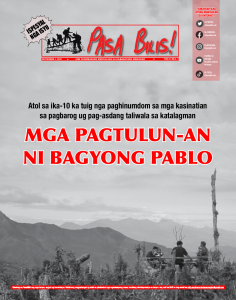A conversation with a peasant activist We will struggle towards the true aspirations of the poor!

(Editors’ Note: Months after Typhoon Pablo, the staff of Pasa Bilis! visited guerilla bases in the region to know the situation of the masses and the territories severely affected by the calamity. One of the most enjoyable was the conversation with a peasant activist in Barrio X. In the middle of a vast rice field, Pasa Bilis! recorded this exchange.)
Pasa Bilis! (PB): Good day, Tay! How have you been faring here?
Tay Binong (TB): Good day to you! We’re good. It’s nice that you visited our place. Coffee?
PB: I had coffee earlier. Where’s Nanay?
TB: She’s with the other women in a meeting. We’re now slowly rebuilding after what we’ve gone through.
PB: Have the houses been repaired here?
TB: They have. But of course, the comrades helped us. The entire mass organization also pitched in the work… Even if our homes are just temporary for now, we’ll prioritize food production. Production work… to alleviate hunger. This is what we agreed upon in our assembly.
PB: Assembly?
TB: The gathering of the barrio people to discuss ways to address the calamity. The extreme hunger. This is an assembly of the peasants’ organization in the barrio—the HOM of PKM.
PB: HOM of PKM?
TB (teasing): Are you sure you’re from Pasa Bilis!? You should already know this! It’s Hingpit nga Organisasyong Masa (solid mass organization) or HOM here in the countryside. The PKM—Pambansang Katipunan ng mga Magsasaka. This is the revolutionary organization that confronts the problems peasants face. For example, rebuilding our community after Pablo.
PB: It’s really wonderful that the poor are wielding power. Development and fast rehabilitation from the storm’s onslaught is definitely attainable.
TB: Yes, that’s because of our campaign to solve hunger. Our crops had been damaged, and we can’t rely on meager relief from the government. Only a small quantity of relief goods reached our community. The radio said that many donated, but no one that we know received substantial help. The government might have pocketed them, or Dinky Soliman of the DSWD. So what we did, to ensure we survive, we launched a communal farming campaign.
PB: Oh, and how about your school?
TB: Yes, the school was also destroyed by the typhoon. We were supposed to take shelter there, but the roof was blown away. After the typhoon, we agreed during our meeting that the school was one of our first priorities for repair. We assigned people daily to ensure the school’s repair so that our children’s schooling wouldn’t be hindered. The work is led by the Committee on Education.
PB: The woman at that house, she had a BP (blood pressure) set with her? What’s her job?
TB: That’s Rima. She is the head of the Committee on Health. She tends to the elderly and regularly checks their blood pressure and other vital signs. We launched a short medical training among our members in order for the health campaign to be in full swing. To avoid disease among children, the health committee constructed comfort rooms. They also learned about herbal medicines, how to make cough syrup, and many more.
PB: So, the committees in your organization are functioning?
TB: That’s what we are striving for. We strengthened our defense campaign, and the people’s militia is active here. There have been news that large, foreign mining and plantations will encroach… We won’t allow them. Those are not our interests, those are the interests of businessmen and the government of the elite. Because of that, we heard that the military will launch operations to clear the area. The AFP is really the soldiers of the rich… And our members realize this. As chairman of the HOM, I strive to educate the people.
PB: How long has your HOM been around?
TB: It’s been a while now. The HOM-PKM was established after the SPL (local Party branch) meeting concluded that most of the peasants here are already organized. We swiftly organized and mobilized our relatives and neighbors because we have a common interest and struggle against those who threaten our livelihood and against land grabbers and landlords.
Furthermore, there’s this CADC* which is a program of the NCIP*. They establish tribal councils that are essentially machineries for displacing us from our land to benefit big mines and plantations. At this time, we have organized 122 households that comprise about 500 residents in our area. We have a common interest to defend our land..
Also at this time, because of the mass movement’s dynamism, we managed to establish a sectoral women’s organization, the HOM-MAKIBAKA*. For the youth, we have the HOM-KM* that is composed of young people aged 13 to 35 years old.
PB: The masses here are right in choosing you as their chairman.
TB: Uy, hehehe. I am just a chairman, which means that I serve the people. They chose me to ensure the implementation of our plans and to mobilize our constituents.
PB: Is it hard to be chairman?
TB: It’s truly a challenge. It’s no matter since I already have wrinkly forehead. Every now and then, I troubleshoot the problems and difficulties in the implementation of our tasks. We should always be able to effectively mobilize both the relatively backwards and advanced segments in our organization, even among those in the leadership.
If we don’t have the support of our constituents, we’ll become mere weak sticks that break easily.
Because the organization’s leaders and constituents are united in their stand and interests, with the guidance and support of comrades, we will persevere through storms. We will continue to wage revolution.
*CADC – Certificate of Ancestral Domain Claim
*NCIP – National Commission on Indigenous People
* MAKIBAKA – Malayang Kilusan ng Bagong Kababaihan
* KM – Kabataang Makabayan
___
First published on Pasa Bilis! July 2013 issue
(Pasa Bilis! Special Issue, December 4, 2022)



